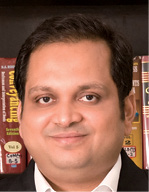The doctrine of “hot news” is a judicially evolved phenomenon which applies to written material and live televised events containing “facts” that have value for a short duration, and which will soon move into the “public realm” losing their value completely.

Given the short timeframes at stake, questions of how to determine value, and underlying doubts about whether hot news should be protected, controversies have arisen as to the extent of protection to be awarded to hot news, and whether it should be protected at all.
The hot news doctrine was formulated by the US Supreme Court in 1918 and first examined by the Indian courts in the case of M/s Marksman Marketing Private Limited v Bharti Tele-Ventures Limited, in which the courts restrained several mobile telecom companies from providing score updates of cricket matches via SMS during India’s tour of Pakistan in 2006. In several subsequent cases, the courts upheld this view.
Current controversy
The doctrine is currently being examined in the case of Star India Pvt Ltd v Piyush Agarwal & Ors. The present controversy started in January 2013 when Star filed three suits in Delhi High Court – against Piyush Agarwal (Cricbuzz), Idea Cellular and OnMobile Global – for permanent injunction and damages. The Board of Control for Cricket in India (BCCI), which was in support of Star, was added as a common defendant in all the suits.
Star contended that the companies had violated rights which were assigned exclusively to Star by BCCI, including mobile rights and rights of mobile activation, and that the dissemination of match updates, scores, etc., via SMS constituted unjust enrichment, unfair competition and criminal misappropriation of property. Star further stated that it had spent huge amounts of money and resources in acquiring the rights related to cricket matches and the defendants had sought no licence to disseminate such information either from Star or BCCI.
The defendants argued that the information which was published by them was published after it had entered the public domain and therefore came under the category of “news”.
High court findings
On 13 March, the single judge ordered: “A limited interim injunction restraining the defendants from disseminating contemporaneous match information in the form of ball-by-ball or minute-by-minute score updates/match alerts for a premium, without obtaining a licence from the plaintiff”. The court further held: “There shall be no restriction upon the defendants to report ‘noteworthy information’ or ‘news’ from cricket matches, as and when they arise, because ‘stale news is no news’. There shall be no requirement for the licence if the defendants do it gratuitously or after a time lag of 15 minutes.”
This decision was challenged in Delhi High Court through an appeal filed by Piyush Agarwal (Cricbuzz), Idea Cellular and OnMobile. They argued that “facts” cannot be owned by anyone and therefore they are incapable of any kind of copyright protection.
On 30 August, the bench dealing with the appeal examined the case from the entirely new perspective of being a restraint on rights guaranteed under article 19(1)(a) and (g) of India’s constitution, which protect freedom of speech, expression and trade. The court in clear words held that whenever there is a difference between a doctrine such as unfair competition, unjust enrichment, etc., and an article of the constitution, the article would prevail over the doctrine. Accordingly, the court set aside the single judge’s order and the interim injunction was removed.
Further appeal
The story does not end there. Last month, the Supreme Court passed an interim order in a special leave petition file by Star, asking the parties to maintain the status quo of the single judge’s decision in March. The court also asked the defendants to deposit ₹1 million (US$16,000) with the high court for every test match, one day international and T-20 match that India plays from the date of the order until the case is pending in the trial court. This order suggests that the Supreme Court might have found merits in Star’s argument although this can only be ascertained once the final judgment in the case is available.
The current status of the case is that a party which has paid for and invested in purchasing the rights is the one that will enjoy the privileges that come with the rights. The essence of the doctrine of “hot news” lies in the time involved. As the single judge said, “stale news is no news”. Therefore, these rights should always be the property of the broadcaster that has invested money and resources for them and their enjoyment by anyone who has not paid for them would amount to infringement.
Manoj K Singh is the founding partner of Singh & Associates, a full-service international law firm with headquarters in New Delhi.
N-30, Malviya Nagar, New Delhi -110017 India
Tel: +91 11 4666 5000, 2668 7993, 2668 0331
Fax: +91 11 2668 2883, 4666 5001
Email: newdelhi@singhassociates.in
Website: www.singhassociates.in



























